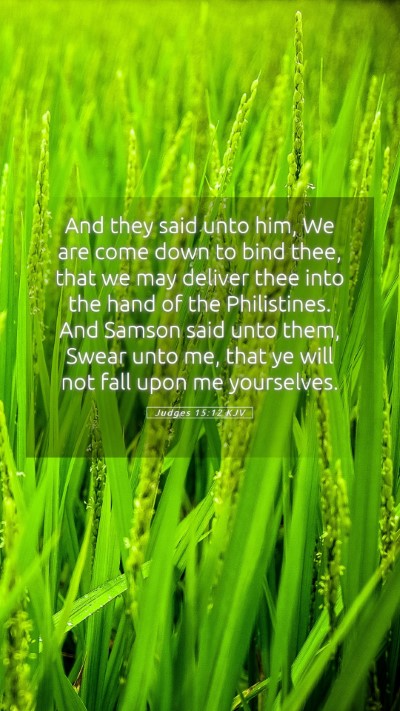Old Testament
Genesis Exodus Leviticus Numbers Deuteronomy Joshua Judges Ruth 1 Samuel 2 Samuel 1 Kings 2 Kings 1 Chronicles 2 Chronicles Ezra Nehemiah Esther Job Psalms Proverbs Ecclesiastes Song of Solomon Isaiah Jeremiah Lamentations Ezekiel Daniel Hosea Joel Amos Obadiah Jonah Micah Nahum Habakkuk Zephaniah Haggai Zechariah MalachiJudges 15:12 Meaning
What is the meaning of Judges 15:12?
And they said unto him, We are come down to bind thee, that we may deliver thee into the hand of the Philistines. And Samson said unto them, Swear unto me, that ye will not fall upon me yourselves.
Judges 15:12 Bible Verse Meaning
Bible Verse Commentary: Judges 15:12
Bible Verse: Judges 15:12 - "And they said unto him, We are come down to bind thee, that we may deliver thee into the hand of the Philistines. And Samson said unto them, Swear unto me, that ye will not fall upon me yourselves."
Contextual Overview
Judges 15:12 is set against the backdrop of Israel's tumultuous history during the period of the judges, where the Philistines served as a prominent adversary. Samson, a Nazirite with extraordinary strength, represents Israel's struggle against oppression and divine purpose.
Interpretation and Analysis
This verse highlights several key themes regarding Samson's experience and the larger narrative of Israel's relationship with the Philistines:
- Context of Betrayal: The Judean men approach Samson, embodying a sense of loyalty yet betrayal - they prioritize their survival under Philistine rule over loyalty to their judge.
- Self-Preservation: Their intent to bind Samson indicates the fear they possess in regard to the Philistines; they view themselves as pawns to maintain their own safety.
- Samson's Acquiescence: Samson's request for an oath not to harm him reflects his awareness of the precarious position he finds himself in, even amongst his own people.
Insights from Commentaries
Matthew Henry Commentary
Henry emphasizes that the men of Judah show a lack of faith in God's deliverance. Their decision to bind Samson rather than to rally behind him signifies a deep-rooted fear and a willingness to compromise their divine calling.
Albert Barnes Commentary
Barnes points out the irony in their approach. Though sought to deliver Samson to the Philistines, they seek to protect themselves, reflecting the moral and spiritual decline of the Israelites during this period.
Adam Clarke Commentary
Clarke notes the implications of Samson's words as a sign of his vulnerability, suggesting that even a man of God can find himself isolated in a time of need. He posits that this moment serves to illustrate the complexity of leadership and sacrifice.
Theological Reflections
This portion of Scripture serves as a deep reflection on the human condition - the struggle for faith amidst fear and the call for courage in the face of betrayal. It invites readers to examine their own lives in relation to how they support leadership, divine purpose, and community identity.
Cross References
- Judges 14:3 - The relationship between Samson and the Philistines.
- 1 Samuel 15:24 - The theme of fear and disobedience.
- Hebrews 11:32-34 - Faith exemplified in the lives of biblical figures, including Samson.
Conclusion
Judges 15:12 serves as a powerful reminder of the complexities of human relationships within the context of divine purpose. The request for an oath reflects the moral ambiguity faced by the Israelites, challenging readers to reflect on their own understanding of loyalty, fear, and divine calling.
Further Bible Study Insights
This verse invites a deeper investigation into:
- Understanding Scripture amidst fear and betrayal.
- The role of divine purpose in human relationships.
- Bible study resources that highlight the significance of faith in moments of trial.
For those engaged in Bible study groups or conducting an online Bible study, this passage invites discussions on the implications of human actions in the face of divine plans. Through Bible study guides and Bible study lessons, participants can extract deeper meaning from similar verses, enhancing their Bible study insights.
Ultimately, this commentary on Judges 15:12 serves to unpack the layers of meaning within this pivotal verse, aiding in the greater understanding of Scripture and enriching Biblical exegesis practices.


